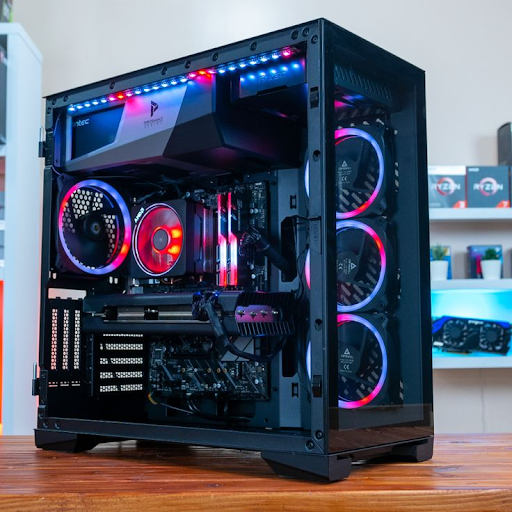Are you a beginner looking to build a custom PC? Building a PC can be confusing, especially if you have zero experience in the matter. Even expert PC builders can make common mistakes, so you should be well-prepared. In this article, we’ll provide a comprehensive PC building checklist to guide you through the process, such as selecting the essential components needed to build your computer.With the increasing popularity of Digital Game Codes, it’s important to make sure your PC meets the necessary requirements for gaming. Before you purchase a game code, make sure you check your PC’s hardware and software specifications. This ensures that the game will run smoothly without any issues or errors.
This checklist will help you avoid common pitfalls and ensure that your PC is up and running! Let’s get started.
What Are the Essential PC Components?
You must purchase the right PC components before building your gaming computer. Looking for the proper components for your build can be overwhelming, but it is quite simple once you learn more about the parts. This pc building checklist will show you a list of all the PC components needed to boot up your gaming computer successfully.
1. Processor/CPU
The central processing unit, or the CPU, is probably one of the most important parts needed for any PC build. It is important to invest well in this component since it is the one that carries the majority of the task loads your PC will handle. The CPU is the computer’s brain because it translates the instructions you give to the computer’s actions.
CPUs are mainly square-shaped parts placed into the CPU socket in the motherboard alongside a CPU cooler. Most CPUs already have stock coolers alongside the processor when bought. The two main manufacturers of processors are AMD and Intel. There are plenty of CPU options available within these brands, from high-end processors to low-end ones.
When looking for high-end processors on AMD’s side, they have multiple products that can handle heavy loads, such as the Ryzen 9. On the other side, Intel also has a selection of great and strong processors, such as their 12th-generation Intel Core I9, which is a very strong processor. However, if you’re on a budget, both still have a healthy collection of low-cost processors that can easily handle low-spec games.
2. Motherboard
The motherboard is a circuit board that holds and connects all the components needed for a pc build. This PC component allows communication between all the hardware components and makes it possible to boot up a PC successfully. Parts such as your CPU, RAM, graphics card, and storage devices are all plugged in and connected to the motherboard.
There are plenty of choices in the PC market regarding motherboards. You don’t have to stress about finding a motherboard that is specific to your needs since there are various motherboards. There are low-end motherboards with simple features and expensive motherboards that offer fancy features and other things that can make building a PC more convenient.
You should note that buying a motherboard depends entirely on the CPU brand you purchased and what features you would want. Remember the CPU model you bought because not every motherboard is compatible with every CPU. For instance, the chip sockets for an Intel CPU won’t work for a motherboard with sockets designed for an AMD Ryzen processor.
There are plenty of features that a motherboard provides, such as CPU overclocking, Bluetooth, wireless connectivity, lighting, ports, storage limits.
3. Random Access Memory (RAM)
The RAM is integral to your gaming computer because it loads your tasks faster. This part of the PC is basically like your computer’s short-term memory because it keeps the data you use easily accessible. Your PC doesn’t have to access your storage device every time you need something open because your RAM is already holding it at the current moment.
When purchasing your RAM, it all comes down to how much budget you have allotted for this PC component because buying more RAM ultimately means better performance. If you’re on a tight budget, 8GB of RAM will be enough to handle your daily tasks and some light gaming.
But opting for 16GB or 32GB RAM choices for better performance and daily usage is even better because you can easily multitask and have multiple applications open simultaneously without lagging. Applications and games always update yearly, so having more RAM can ensure longevity.
4. Graphics Processing Unit (GPU)
The Graphics Processing Unit (GPU), commonly called the video card, is a crucial component that significantly impacts the quality of your gaming experience. Its primary role is to handle complex graphics calculations required to run high-resolution PC games. Although some CPUs have integrated graphics, these are generally insufficient for triple-A games.
Investing in a capable graphics card is necessary to avoid frame drops or crashes while playing modern PC games. The two leading competitors in the market are AMD and Nvidia, each offering a range of graphics cards to meet varying needs. If you’re only interested in light gaming, both manufacturers provide low-end GPUs that can handle small games.
For the most high-end gaming experience, investing more in a graphics card is recommended. This PC part will enable you to achieve gaming at higher resolutions with consistently high frame rates. If you want to fulfill your gaming needs, AMD Radeon RX 6600 is an excellent option. Meanwhile, Nvidia offers a broad selection of graphics cards, including high-end options like the GeForce RTX 4090.
5. Storage Device
Storage devices are also important to complete your PC build because this is where all your data and files are stored. Files such as games, applications, operating systems, and accessible data are kept on your storage devices. There are plenty of storage devices, with hard disk drives being the most common one in the past.
Besides hard drives, solid-state drives (SSD) have become a popular and readily available type of storage because it is greatly faster, quieter, and more durable than a hard drive. SSDs can boot up your computer much quicker and launch applications and games faster, making them more expensive than hard disk drives.
Also, SSDs are sold at smaller capacities, with options such as 240GB and 500GB as the most common and affordable choices for SSDS. This might seem like a small amount of storage because hard drives are usually around 1TB, but it is because SSDs are significantly faster than hard drives. However, if you want both speed and capacity in one storage device, SSDs are available in 1TB and 2TB options.
It is typically best to have an SSD and a hard drive for your computer to get speed and storage. For instance, if you need fast boot-up times and want to launch your games faster, storing your operating system and games inside the SSD will make them faster.
Meanwhile, other files like videos and less important applications can be stored on a hard drive so that it doesn’t consume more of your SSD’s space.
6. Power Supply Unit (PSU)
The PSU is the component of your computer that provides power so that your system can turn on. Many PC builders neglect the power supply since they can settle with low-end power supplies to splurge on parts like the graphics card and processor.
Do not try to imitate other PC builders that settle for generic power supplies because you could destroy your entire build by not supplying it with enough wattage. You should learn about the specs of a power supply, such as the wattage, efficiencies, rating, and quality, so that you can invest in a proper one.
When building your gaming computer, you will need a power supply with the proper wattage and rating, especially if it is stacked with high-end parts. Power supplies are usually labeled with bronze, silver, and gold ratings, but it is best to get gold ratings to have better peace of mind about their quality.
If you want a PSU that can supply enough power to your high-end gaming build, the EVGA SuperNOVA 1300W Gold will be enough to let your PC boot up properly.
7. PC Case
The casing of your computer is where you will place all the parts previously mentioned and is what keeps them safe. PC cases are very customizable because various designs cater to your needs. Even with different designs, cases are made to hold the same parts, which means every PC case can hold your motherboard, CPU, and the like.
There are different types of cases, just like with the other PC components, such as ATX, MATX, and ITX cases. Don’t be intimidated by the names because these are just the cases’ sizes. ATX cases are the largest, and ITX cases are the smallest. These are meant to cater to the sizes of motherboards and power supplies because they also have these types of sizes.
Before buying your PC case, consider cooling, layout, size, spacing, and wiring factors. Luckily, plenty of reputable brands offer quality PC cases, such as the Corsair 7000D.
Start Building Your PC Now!
Get to learn more about the process of creating a PC from scratch by using this beginner’s checklist guide for PC building. Once you learn more about the parts of a computer, you will become less overwhelmed when dealing with these components once you are building your PC. Purchase the essential PC parts and start building the PC of your dreams today!








